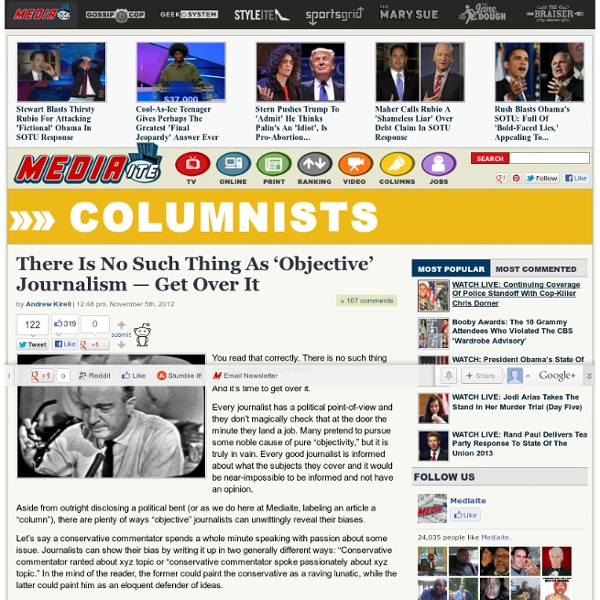



http://www.mediaite.com/online/there-is-no-such-thing-as-objective-journalism-get-over-it/
Should Journalists Be Objective or Tell the Truth? Is it a reporter's job to be objective or to tell the truth, even if it means contradicting statements by public officials in news stories? That's the debate New York Times public editor Arthur Brisbane stumbled into recently when he raised that question in his column. In a piece headlined "Should The Times Be a Truth Vigilante?", Brisbane noted that Times columnist Paul Krugman "clearly has the freedom to call out what he thinks is a lie." Then he asked, "should news reporters do the same?" Objectivity is an unabtainable goal. by This page has been accessed since 29 May 1996. The oft-stated and highly desired goal of modern journalism is objectivity, the detached and unprejudiced gathering and dissemination of news and information.
Objectivity in Journalism DAVID BROOKS There is some dispute about whether objectivity can really exist. How do we know the truth? Well, I’m not a relativist on the subject. I think there is truth out there and that objectivity is like virtue; it's the thing you always fall short of, but the thing you always strive toward. And by the way, I think that opinion journalists have to be objective just as much as straight reporters. Opinion journalists, too, have to be able to see reality wholly and truly.
Against “Objective” Journalism The conventional model of “objectivity” in professional journalism (otherwise known as “he said, she said” and “stenography”), as it’s practiced today in the dead tree media, goes back to Walter Lippmann. As Christopher Lasch described it, in The Revolt of the Elites, Lippmann’s view of society and government in general was that [s]ubstantive questions could be safely left to experts, whose access to scientific knowledge immunized them against the emotional “symbols” and “stereotypes” that dominated public debate. His influence on twentieth century journalism, in particular, was to destroy the earlier function of newspapers in the nineteenth century as the center of democratic debate. Newspapers might have served as extensions of the town meeting.
Negative Arguements of Journalism Objectivity Volume 18, Number 4, 1993 Back to the Table of Contents © Canadian Journal of Communication Gilles Gauthier1 Université Laval If thought is to go far enough, the imagination must go further. Objectivity (journalism) Journalistic objectivity is a significant principle of journalistic professionalism. Journalistic objectivity can refer to fairness, disinterestedness, factuality, and nonpartisanship, but most often encompasses all of these qualities. Definitions[edit]
The Myth Of Objective Journalism - Joe Sacco Interviewed Two weeks before Palestine defeats Israel and US opposition by receiving an upgrade to UN member state observer status, we’re speaking to Joe Sacco over the phone from his home town of Portland, Oregon. It’s during Israel’s Operation Pillar Of Defence and a day after the air attack which kills Hamas military leader in Gaza, Ahmed Jabari. Israel’s Prime Minister Binyamin Netanyahu is sabre-rattling over the threat of an Israeli ground attack following retaliatory rocket fire from Gaza. Objectivity is something to strive for. In “Losing the News: The Future of the News that Feeds Democracy,” published by Oxford University Press, Alex S. Jones, a 1982 Nieman Fellow and director of the Joan Shorenstein Center on the Press, Politics and Public Policy at Harvard University, describes in its prologue his purpose and intent in writing about the “genuine crisis” in news. “It is not one of press bias, though that is how most people seem to view it,” he contends. “Rather, it is a crisis of diminishing quantity and quality, of morale and sense of mission, of values and leadership.” In this excerpt from the chapter “Objectivity’s Last Stand,” Jones reminds readers how objectivity assumed its role in the tradition of American journalism, what “authentic journalistic objectivity” looks like when practiced well, and why it matters so much to the future of news reporting.
Why Objectivity Still Matters The notion that reporters should be objective is taking a beating these days, and the assault couldn’t come at a worse time for the public. With the proliferation of devil-may-care bloggers and the factsbe- damned TV cable shout fests, the culture of our profession is trending toward a journalistic Woodstock, where everything except disciplined reporting is considered cool. In the Winter 2004 issue of Nieman Reports, Geneva Overholser of the Missouri School of Journalism and a highly respected professional, denounced objectivity as “worse than useless,” even harmful. She called for “a forthright jettisoning of the objectivity credo.” Objectivity, she wrote, has become “an extremely effective cudgel” against the press for anyone who disagrees with its stories.
Principles of Journalism The first three years of the Project’s work involved listening and talking with journalists and others around the country about what defines the work. What emerged out of those conversations are the following nine core principles of journalism: 1. Journalism’s first obligation is to the truth Journalism and it's effect on Objectivity. Objectivity is an important aspect which needs to be considered in the practise of journalism. It is seen as a professional ideal which has become a troubling debate in modern journalism, leading to many questions. Does objectivity undermine the press as being the eyes and ears of the public? Or is it better serving the public to offer a variety of views?
Objectivity has changed – why hasn’t journalism? The following is cross-posted from a guest post I wrote for Wannabe Hacks. Objectivity is one of the key pillars of journalistic identity: it is one of the ways in which we identify ourselves as a profession. But for the past decade it has been subject to increasing criticism from those (and I include myself here) who suggest that sustaining the appearance of objectivity is unfeasible and unsustainable, and that transparency is a much more realistic aim. Recently I’ve been revisiting some of the research on journalistic objectivity for my inaugural lecture at City University. But as I only mention objectivity once in that lecture, I thought it was worth fleshing out the issue further. Things change